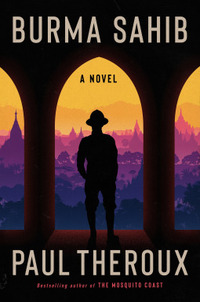The Morningside by Téa Obreht
 Monday, March 18, 2024 at 7:50AM
Monday, March 18, 2024 at 7:50AM 
Published by Random House on March 19, 2024
Téa Obreht writes allegorical novels. The Morningside is the story of people who feel the need to keep silent about their past to survive in the present. The key characters, Sylvia and her mother, represent everyone who has fled from a difficult circumstance and who fears being judged (or condemned, or killed) if they reveal the truth of their history.
For reasons that are only vaguely explained, Silvia and her mother left their home country as refugees. (All cities and countries in the book have fictional names. In keeping with the book's allegorical nature, they represent many places.) Silvia and her mother seem to have fled both a war and an environmental disaster that bears the signs (fires and floods) of global warming. Their passage was perilous. Along the way they joined a refugee camp. A war criminal was eventually placed in charge of clearing out the camp. His methods were unsound.
Sylvia’s mother taught her to hide her nationality so people will not make assumptions about what side she was on during the war or why she left. “It’s always dangerous to give people a way to tell themselves stories about you before they get to know you.” Yet Sylvia’s mother hides her past even from Sylvia, leaving her daughter to guess at the details of her homeland and the life her mother once lived.
Silvia and her mother now live in Island City, a place that might be a flooded Manhattan. The southern end of the island is underwater when the tides are in. The rules that govern residents include the consumption of government-supplied food rations and a prohibition against eating meat, although the rules don’t seem to apply to the wealthier island residents. A pirate radio station run by the Dispatcher gives a voice to less fortunate Island City residents.
Silvia and her mother are supposedly beneficiaries of the Repopulation Program. They were “recruited from abroad to move in and sway the balance against total urban abandonment.” Program beneficiaries have been promised better housing and newly constructed schools in the southern end of the island when the flooding recedes. The program is corrupt and the promises seem hollow. They give false hope to the relocated refugees. False hope might be better than none.
In the meantime, Silvia and her mother have been installed in Morningside, a large apartment building that was once elegant. Sylvia’s mother is employed as its superintendent. Many residents of Morningside have retained their wealth, including Bezi Duras, a mysterious woman who lives in the penthouse with her three large dogs.
Silvia lives a friendless, isolated life. She does chores in the Morningside, argues with her mother, and listens to the Dispatcher. When a new family moves into the Morningside, Silvia thinks she might finally have a friend in a girl named Mila, but the rude and bossy girl seems intent on getting into trouble and dragging timid Silvia along with her.
Silvia draws conclusions about her worlds that are rooted in the supernatural. She places objects (an empty perfume bottle, broken scissors) in places where they will support a spell of protection to keep her mother safe. A belief in the supernatural was instilled in Silvia by Ena, a now-deceased aunt (her mother’s or hers or just an aunt in general) who is the only relative other than her mother Silvia has ever known. Silvia believes Bezi Duras is a Vila (sort of a malignant fairy) and that her dogs are actually men who take canine form. Silvia’s beliefs are probably the imaginings of a young girl that were encouraged by Ena, but who knows? Obreht has a talent for making the supernatural seem natural.
Perhaps, as Silvia’s mother argues, a belief in magic prevents believers from having “a sense of true consequences.” Substitute “religion” for “magic” and Obreht might be weighing in on the reality of a benevolent god who allows refugees to endure enormous suffering at the hands of war criminals. Yet even in adulthood, Silvia will not surrender her belief that magic is real. She has always lived with the guilt that she saved her mother’s life by asking the Vila to take another person in her mother’s place at a time when her mother’s life was in danger. Whether that person was taken, what actually happened to her, is one of the novel’s unresolved ambiguities.
By the novel’s end, Silvia’s place of birth no longer exists. Events have forced Silvia, her mother, and the Dispatcher to remake their lives outside of Island City. The journey from an arbitrary birthplace to a place that feels like home is the story of refugees throughout history — at least, it is the story of refugees who manage to survive their ordeal. As Silvia’s mother observes, they are searching for light and its comforting illusion of warmth. Perhaps they can find it somewhere.
Obreht is a pleasure to read. Her first novel was a masterpiece. The two that have followed, while less stunning, continue the theme of finding lessons and hope in the hardships and mysteries of life. Obreht's reliance on folklore and mythology illuminates the darkness of modern times. As always, Obreht’s prose is both precise and evocative. The Morningside is a novel of allegorical truth that bears rereading.
RECOMMENDED
 TChris |
TChris |  Post a Comment |
Post a Comment |  Téa Obreht in
Téa Obreht in  General Fiction
General Fiction 



